Intellij IDEA搭建jdk1.8.0_202源码阅读环境
JDK1.8版本号:jdk1.8.0_202(提取码:n937)
一、找到源码位置
其实我们在安装JDK完时就源码就已经存在,所有要找到JDK所安装的目录,会看到src.zip、javafx-src.zip的压缩包,这里面就是JDK的源码,例如下图:

二、Intellij IDEA搭建源码阅读环境
1、Intellij IDEA新建java项目
打开Intellij IDEA,菜单栏File > Project,新建简单java项目,例如下图:

在点Next, 填写项目名称和保存项目目录,例如下图:

点击finish后,项目创建完成,例如下图:
![]()
2、把源码src.zip解压到该工程下的src目录下,并新建Main类
3、将原来关联的jdk安装目录下的源码src.zip替换成jdk1.8.0_202-source-analysis的src
为了避免修改原来的SDKs,另外再添加一个名为“jdk1.8.0_202-source-analysis”的jdk,并移除src.zip
File ->Project Structure->Platform Settings ->SDKs

将jdk源码项目src添加到sourcepath中
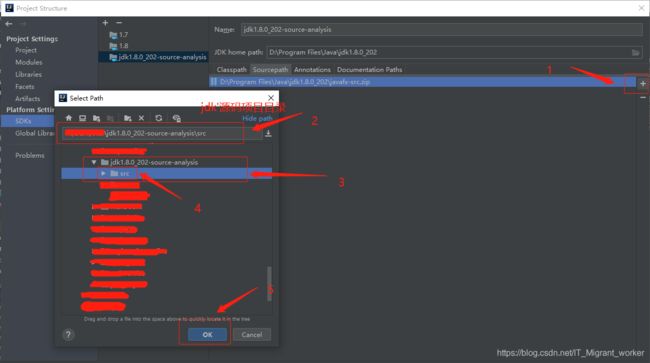
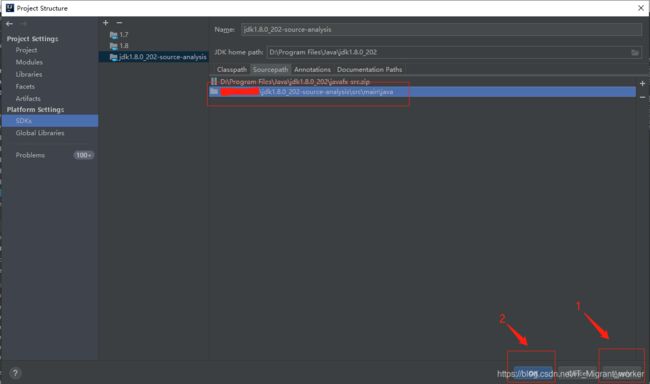
修改项目(jdk1.8.0_202-source-analysis)使用的jdk为新建的“jdk1.8.0_202-source-analysis” jdk
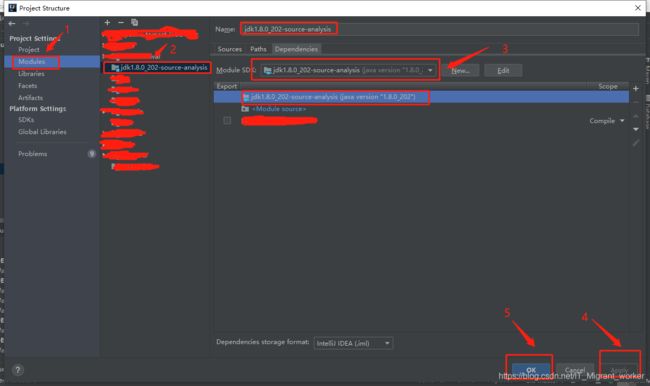
三、运行Main类的main方法
如果运行不成功,会出现以下错误提示:
Error:java: OutOfMemoryError: insufficient memory(系统资源不足)
程序包com.sun.tools.javac.api不存在
找不到sun.awt.UNIXToolkit
找不到sun.font.FontConfigManager
1、Error:java: OutOfMemoryError: insufficient memory
错误原因
导致这个错误的原因主要是因为jdk版本问题,此处有两个原因,一个是编译版本不匹配,一个是当前项目jdk版本不支持。
查看项目的jdk
File ->Project Structure->Project Settings ->Project
或使用快捷键Ctrl+Alt+shift+S打开项目的jdk配置:
查看此两处是否与目标jdk一致
查看工程的jdk
点击上图中Modules查看对应jdk版本:

查看java编译器版本
File–>Setting…–>Build,Execution,Deployment–>Compiler–>Java Compiler
设置相应Module的target bytecode version与jkd一致版本

针对此问题,重新打开或修改pom文件(maven项目)中的内容很可能导致jdk版本重新变为1.5。如果是maven项目,可在pom文件中指定jdk相关信息:
org.apache.maven.plugins
maven-compiler-plugin
1.8
1.8
查看构建过程编译器所需的堆大小
File–>Setting…–>Build,Execution,Deployment–>Compiler
堆大小可由原来的700改为1000
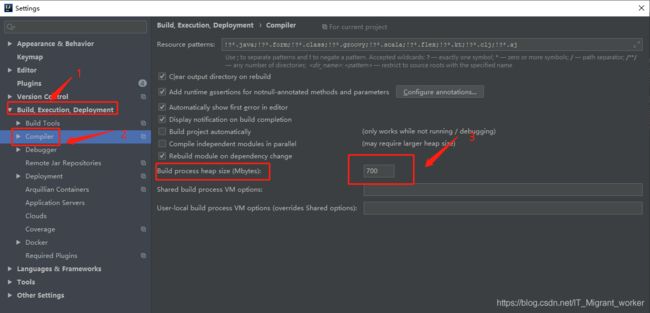
2、程序包com.sun.tools.javac.api不存在
手动将jdk安装目录下lib包中tools.jar添加到项目中
File ->Project Structure->Project Settings ->Libraries

将tools.jar lib添加到jdk1.8.0_202-source-analysis项目中

点击ok后。解决Error:(40, 31) java: 程序包com.sun.tools.javac.api不存在问题
3、找不到sun.awt.UNIXToolkit、找不到sun.font.FontConfigManager
解决缺少的这两个类,可以去OpenJDK(传送门)拷贝


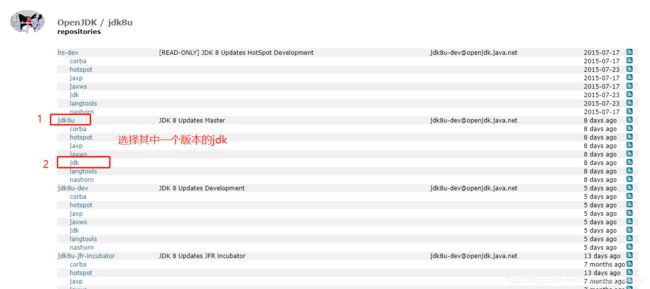
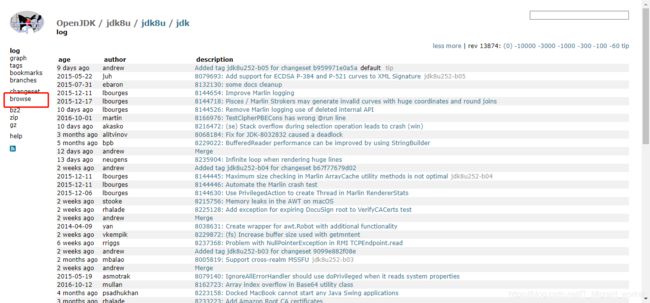

找到UNIXToolkit类,将UNIXToolkit类中的内容( 传送门)拷贝到项目的src\main\java\下,新建“sun\awt”包中的新建“UNIXToolkit.java”中


到此已解决sun.awt.UNIXToolkit找不到的错误
送佛送到西,对应本项目中jdk中的UNIXToolkit类内容如下,注意:其他jdk版本自行拷贝
/*
* Copyright (c) 2004, 2018, Oracle and/or its affiliates. All rights reserved.
* DO NOT ALTER OR REMOVE COPYRIGHT NOTICES OR THIS FILE HEADER.
*
* This code is free software; you can redistribute it and/or modify it
* under the terms of the GNU General Public License version 2 only, as
* published by the Free Software Foundation. Oracle designates this
* particular file as subject to the "Classpath" exception as provided
* by Oracle in the LICENSE file that accompanied this code.
*
* This code is distributed in the hope that it will be useful, but WITHOUT
* ANY WARRANTY; without even the implied warranty of MERCHANTABILITY or
* FITNESS FOR A PARTICULAR PURPOSE. See the GNU General Public License
* version 2 for more details (a copy is included in the LICENSE file that
* accompanied this code).
*
* You should have received a copy of the GNU General Public License version
* 2 along with this work; if not, write to the Free Software Foundation,
* Inc., 51 Franklin St, Fifth Floor, Boston, MA 02110-1301 USA.
*
* Please contact Oracle, 500 Oracle Parkway, Redwood Shores, CA 94065 USA
* or visit www.oracle.com if you need additional information or have any
* questions.
*/
package sun.awt;
import java.awt.RenderingHints;
import static java.awt.RenderingHints.*;
import java.awt.color.ColorSpace;
import java.awt.image.*;
import java.security.AccessController;
import java.security.PrivilegedAction;
import sun.security.action.GetIntegerAction;
import com.sun.java.swing.plaf.gtk.GTKConstants.TextDirection;
import sun.java2d.opengl.OGLRenderQueue;
import sun.security.action.GetPropertyAction;
public abstract class UNIXToolkit extends SunToolkit
{
/** All calls into GTK should be synchronized on this lock */
public static final Object GTK_LOCK = new Object();
private static final int[] BAND_OFFSETS = { 0, 1, 2 };
private static final int[] BAND_OFFSETS_ALPHA = { 0, 1, 2, 3 };
private static final int DEFAULT_DATATRANSFER_TIMEOUT = 10000;
// Allowed GTK versions
public enum GtkVersions {
ANY(0),
GTK2(Constants.GTK2_MAJOR_NUMBER),
GTK3(Constants.GTK3_MAJOR_NUMBER);
static class Constants {
static final int GTK2_MAJOR_NUMBER = 2;
static final int GTK3_MAJOR_NUMBER = 3;
}
final int number;
GtkVersions(int number) {
this.number = number;
}
public static GtkVersions getVersion(int number) {
switch (number) {
case Constants.GTK2_MAJOR_NUMBER:
return GTK2;
case Constants.GTK3_MAJOR_NUMBER:
return GTK3;
default:
return ANY;
}
}
// major GTK version number
public int getNumber() {
return number;
}
};
private Boolean nativeGTKAvailable;
private Boolean nativeGTKLoaded;
private BufferedImage tmpImage = null;
public static int getDatatransferTimeout() {
Integer dt = (Integer)AccessController.doPrivileged(
new GetIntegerAction("sun.awt.datatransfer.timeout"));
if (dt == null || dt <= 0) {
return DEFAULT_DATATRANSFER_TIMEOUT;
} else {
return dt;
}
}
/**
* Returns true if the native GTK libraries are capable of being
* loaded and are expected to work properly, false otherwise. Note
* that this method will not leave the native GTK libraries loaded if
* they haven't already been loaded. This allows, for example, Swing's
* GTK L&F to test for the presence of native GTK support without
* leaving the native libraries loaded. To attempt long-term loading
* of the native GTK libraries, use the loadGTK() method instead.
*/
@Override
public boolean isNativeGTKAvailable() {
synchronized (GTK_LOCK) {
if (nativeGTKLoaded != null) {
// We've already attempted to load GTK, so just return the
// status of that attempt.
return nativeGTKLoaded;
} else if (nativeGTKAvailable != null) {
// We've already checked the availability of the native GTK
// libraries, so just return the status of that attempt.
return nativeGTKAvailable;
} else {
boolean success = check_gtk(getEnabledGtkVersion().getNumber());
nativeGTKAvailable = success;
return success;
}
}
}
/**
* Loads the GTK libraries, if necessary. The first time this method
* is called, it will attempt to load the native GTK library. If
* successful, it leaves the library open and returns true; otherwise,
* the library is left closed and returns false. On future calls to
* this method, the status of the first attempt is returned (a simple
* lightweight boolean check, no native calls required).
*/
public boolean loadGTK() {
synchronized (GTK_LOCK) {
if (nativeGTKLoaded == null) {
nativeGTKLoaded = load_gtk(getEnabledGtkVersion().getNumber(),
isGtkVerbose());
}
}
return nativeGTKLoaded;
}
/**
* Overridden to handle GTK icon loading
*/
protected Object lazilyLoadDesktopProperty(String name) {
if (name.startsWith("gtk.icon.")) {
return lazilyLoadGTKIcon(name);
}
return super.lazilyLoadDesktopProperty(name);
}
/**
* Load a native Gtk stock icon.
*
* @param longname a desktop property name. This contains icon name, size
* and orientation, e.g. "gtk.icon.gtk-add.4.rtl"
* @return an Image for the icon, or null if the
* icon could not be loaded
*/
protected Object lazilyLoadGTKIcon(String longname) {
// Check if we have already loaded it.
Object result = desktopProperties.get(longname);
if (result != null) {
return result;
}
// We need to have at least gtk.icon...
String str[] = longname.split("\\.");
if (str.length != 5) {
return null;
}
// Parse out the stock icon size we are looking for.
int size = 0;
try {
size = Integer.parseInt(str[3]);
} catch (NumberFormatException nfe) {
return null;
}
// Direction.
TextDirection dir = ("ltr".equals(str[4]) ? TextDirection.LTR :
TextDirection.RTL);
// Load the stock icon.
BufferedImage img = getStockIcon(-1, str[2], size, dir.ordinal(), null);
if (img != null) {
// Create the desktop property for the icon.
setDesktopProperty(longname, img);
}
return img;
}
/**
* Returns a BufferedImage which contains the Gtk icon requested. If no
* such icon exists or an error occurs loading the icon the result will
* be null.
*
* @param filename
* @return The icon or null if it was not found or loaded.
*/
public BufferedImage getGTKIcon(final String filename) {
if (!loadGTK()) {
return null;
} else {
// Call the native method to load the icon.
synchronized (GTK_LOCK) {
if (!load_gtk_icon(filename)) {
tmpImage = null;
}
}
}
// Return local image the callback loaded the icon into.
return tmpImage;
}
/**
* Returns a BufferedImage which contains the Gtk stock icon requested.
* If no such stock icon exists the result will be null.
*
* @param widgetType one of WidgetType values defined in GTKNativeEngine or
* -1 for system default stock icon.
* @param stockId String which defines the stock id of the gtk item.
* For a complete list reference the API at www.gtk.org for StockItems.
* @param iconSize One of the GtkIconSize values defined in GTKConstants
* @param textDirection One of the TextDirection values defined in
* GTKConstants
* @param detail Render detail that is passed to the native engine (feel
* free to pass null)
* @return The stock icon or null if it was not found or loaded.
*/
public BufferedImage getStockIcon(final int widgetType, final String stockId,
final int iconSize, final int direction,
final String detail) {
if (!loadGTK()) {
return null;
} else {
// Call the native method to load the icon.
synchronized (GTK_LOCK) {
if (!load_stock_icon(widgetType, stockId, iconSize, direction, detail)) {
tmpImage = null;
}
}
}
// Return local image the callback loaded the icon into.
return tmpImage; // set by loadIconCallback
}
/**
* This method is used by JNI as a callback from load_stock_icon.
* Image data is passed back to us via this method and loaded into the
* local BufferedImage and then returned via getStockIcon.
*
* Do NOT call this method directly.
*/
public void loadIconCallback(byte[] data, int width, int height,
int rowStride, int bps, int channels, boolean alpha) {
// Reset the stock image to null.
tmpImage = null;
// Create a new BufferedImage based on the data returned from the
// JNI call.
DataBuffer dataBuf = new DataBufferByte(data, (rowStride * height));
// Maybe test # channels to determine band offsets?
WritableRaster raster = Raster.createInterleavedRaster(dataBuf,
width, height, rowStride, channels,
(alpha ? BAND_OFFSETS_ALPHA : BAND_OFFSETS), null);
ColorModel colorModel = new ComponentColorModel(
ColorSpace.getInstance(ColorSpace.CS_sRGB), alpha, false,
ColorModel.TRANSLUCENT, DataBuffer.TYPE_BYTE);
// Set the local image so we can return it later from
// getStockIcon().
tmpImage = new BufferedImage(colorModel, raster, false, null);
}
private static native boolean check_gtk(int version);
private static native boolean load_gtk(int version, boolean verbose);
private static native boolean unload_gtk();
private native boolean load_gtk_icon(String filename);
private native boolean load_stock_icon(int widget_type, String stock_id,
int iconSize, int textDirection, String detail);
private native void nativeSync();
private static native int get_gtk_version();
@Override
public void sync() {
// flush the X11 buffer
nativeSync();
// now flush the OGL pipeline (this is a no-op if OGL is not enabled)
OGLRenderQueue.sync();
}
/*
* This returns the value for the desktop property "awt.font.desktophints"
* It builds this by querying the Gnome desktop properties to return
* them as platform independent hints.
* This requires that the Gnome properties have already been gathered.
*/
public static final String FONTCONFIGAAHINT = "fontconfig/Antialias";
@Override
protected RenderingHints getDesktopAAHints() {
Object aaValue = getDesktopProperty("gnome.Xft/Antialias");
if (aaValue == null) {
/* On a KDE desktop running KWin the rendering hint will
* have been set as property "fontconfig/Antialias".
* No need to parse further in this case.
*/
aaValue = getDesktopProperty(FONTCONFIGAAHINT);
if (aaValue != null) {
return new RenderingHints(KEY_TEXT_ANTIALIASING, aaValue);
} else {
return null; // no Gnome or KDE Desktop properties available.
}
}
/* 0 means off, 1 means some ON. What would any other value mean?
* If we require "1" to enable AA then some new value would cause
* us to default to "OFF". I don't think that's the best guess.
* So if its !=0 then lets assume AA.
*/
boolean aa = ((aaValue instanceof Number)
&& ((Number) aaValue).intValue() != 0);
Object aaHint;
if (aa) {
String subpixOrder =
(String)getDesktopProperty("gnome.Xft/RGBA");
if (subpixOrder == null || subpixOrder.equals("none")) {
aaHint = VALUE_TEXT_ANTIALIAS_ON;
} else if (subpixOrder.equals("rgb")) {
aaHint = VALUE_TEXT_ANTIALIAS_LCD_HRGB;
} else if (subpixOrder.equals("bgr")) {
aaHint = VALUE_TEXT_ANTIALIAS_LCD_HBGR;
} else if (subpixOrder.equals("vrgb")) {
aaHint = VALUE_TEXT_ANTIALIAS_LCD_VRGB;
} else if (subpixOrder.equals("vbgr")) {
aaHint = VALUE_TEXT_ANTIALIAS_LCD_VBGR;
} else {
/* didn't recognise the string, but AA is requested */
aaHint = VALUE_TEXT_ANTIALIAS_ON;
}
} else {
aaHint = VALUE_TEXT_ANTIALIAS_DEFAULT;
}
return new RenderingHints(KEY_TEXT_ANTIALIASING, aaHint);
}
private native boolean gtkCheckVersionImpl(int major, int minor,
int micro);
/**
* Returns {@code true} if the GTK+ library is compatible with the given
* version.
*
* @param major
* The required major version.
* @param minor
* The required minor version.
* @param micro
* The required micro version.
* @return {@code true} if the GTK+ library is compatible with the given
* version.
*/
public boolean checkGtkVersion(int major, int minor, int micro) {
if (loadGTK()) {
return gtkCheckVersionImpl(major, minor, micro);
}
return false;
}
public static GtkVersions getEnabledGtkVersion() {
String version = AccessController.doPrivileged(
new GetPropertyAction("jdk.gtk.version"));
if (version == null) {
return GtkVersions.ANY;
} else if (version.startsWith("2")) {
return GtkVersions.GTK2;
} else if("3".equals(version) ){
return GtkVersions.GTK3;
}
return GtkVersions.ANY;
}
public static GtkVersions getGtkVersion() {
return GtkVersions.getVersion(get_gtk_version());
}
public static boolean isGtkVerbose() {
return AccessController.doPrivileged((PrivilegedAction)()
-> Boolean.getBoolean("jdk.gtk.verbose"));
}
}
找到FontConfigManager类,将FontConfigManager类中的内容( 传送门)拷贝到项目的src\main\java\下,新建“sun\font”包中的新建“FontConfigManager.java”中


到此已解决sun.font.FontConfigManager找不到的错误
送佛送到西,对应本项目中jdk中的FontConfigManager类内容如下,注意:其他jdk版本自行拷贝
/*
* Copyright (c) 2008, 2013, Oracle and/or its affiliates. All rights reserved.
* DO NOT ALTER OR REMOVE COPYRIGHT NOTICES OR THIS FILE HEADER.
*
* This code is free software; you can redistribute it and/or modify it
* under the terms of the GNU General Public License version 2 only, as
* published by the Free Software Foundation. Oracle designates this
* particular file as subject to the "Classpath" exception as provided
* by Oracle in the LICENSE file that accompanied this code.
*
* This code is distributed in the hope that it will be useful, but WITHOUT
* ANY WARRANTY; without even the implied warranty of MERCHANTABILITY or
* FITNESS FOR A PARTICULAR PURPOSE. See the GNU General Public License
* version 2 for more details (a copy is included in the LICENSE file that
* accompanied this code).
*
* You should have received a copy of the GNU General Public License version
* 2 along with this work; if not, write to the Free Software Foundation,
* Inc., 51 Franklin St, Fifth Floor, Boston, MA 02110-1301 USA.
*
* Please contact Oracle, 500 Oracle Parkway, Redwood Shores, CA 94065 USA
* or visit www.oracle.com if you need additional information or have any
* questions.
*/
package sun.font;
import java.util.Locale;
import sun.awt.SunHints;
import sun.awt.SunToolkit;
import sun.util.logging.PlatformLogger;
/**
* Small utility class to manage FontConfig.
*/
public class FontConfigManager {
static boolean fontConfigFailed = false;
/* This is populated by native */
private static final FontConfigInfo fcInfo = new FontConfigInfo();
/* Begin support for GTK Look and Feel - query libfontconfig and
* return a composite Font to Swing that uses the desktop font(s).
*/
/* These next three classes are just data structures.
*/
public static class FontConfigFont {
public String familyName; // eg Bitstream Vera Sans
public String styleStr; // eg Bold
public String fullName; // eg Bitstream Vera Sans Bold
public String fontFile; // eg /usr/X11/lib/fonts/foo.ttf
}
public static class FcCompFont {
public String fcName; // eg sans
public String fcFamily; // eg sans
public String jdkName; // eg sansserif
public int style; // eg 0=PLAIN
public FontConfigFont firstFont;
public FontConfigFont[] allFonts;
//boolean preferBitmaps; // if embedded bitmaps preferred over AA
public CompositeFont compFont; // null if not yet created/known.
}
public static class FontConfigInfo {
public int fcVersion;
public String[] cacheDirs = new String[4];
}
/* fontconfig recognises slants roman, italic, as well as oblique,
* and a slew of weights, where the ones that matter here are
* regular and bold.
* To fully qualify what we want, we can for example ask for (eg)
* Font.PLAIN : "serif:regular:roman"
* Font.BOLD : "serif:bold:roman"
* Font.ITALIC : "serif:regular:italic"
* Font.BOLD|Font.ITALIC : "serif:bold:italic"
*/
private static String[] fontConfigNames = {
"sans:regular:roman",
"sans:bold:roman",
"sans:regular:italic",
"sans:bold:italic",
"serif:regular:roman",
"serif:bold:roman",
"serif:regular:italic",
"serif:bold:italic",
"monospace:regular:roman",
"monospace:bold:roman",
"monospace:regular:italic",
"monospace:bold:italic",
};
/* This array has the array elements created in Java code and is
* passed down to native to be filled in.
*/
private FcCompFont[] fontConfigFonts;
/**
* Instantiates a new FontConfigManager getting the default instance
* of FontManager from the FontManagerFactory.
*/
public FontConfigManager() {
}
/* Called from code that needs to know what are the AA settings
* that apps using FC would pick up for the default desktop font.
* Note apps can change the default desktop font. etc, so this
* isn't certain to be right but its going to correct for most cases.
* Native return values map to the text aa values in sun.awt.SunHints.
* which is used to look up the renderinghint value object.
*/
public static Object getFontConfigAAHint() {
return getFontConfigAAHint("sans");
}
/* This is public solely so that for debugging purposes it can be called
* with other names, which might (eg) include a size, eg "sans-24"
* The return value is a text aa rendering hint value.
* Normally we should call the no-args version.
*/
public static Object getFontConfigAAHint(String fcFamily) {
if (FontUtilities.isWindows) {
return null;
} else {
int hint = getFontConfigAASettings(getFCLocaleStr(), fcFamily);
if (hint < 0) {
return null;
} else {
return SunHints.Value.get(SunHints.INTKEY_TEXT_ANTIALIASING,
hint);
}
}
}
private static String getFCLocaleStr() {
Locale l = SunToolkit.getStartupLocale();
String localeStr = l.getLanguage();
String country = l.getCountry();
if (!country.equals("")) {
localeStr = localeStr + "-" + country;
}
return localeStr;
}
/* This does cause the native libfontconfig to be loaded and unloaded,
* but it does not incur the overhead of initialisation of its
* data structures, so shouldn't have a measurable impact.
*/
public static native int getFontConfigVersion();
/* This can be made public if it's needed to force a re-read
* rather than using the cached values. The re-read would be needed
* only if some event signalled that the fontconfig has changed.
* In that event this method would need to return directly the array
* to be used by the caller in case it subsequently changed.
*/
public synchronized void initFontConfigFonts(boolean includeFallbacks) {
if (fontConfigFonts != null) {
if (!includeFallbacks || (fontConfigFonts[0].allFonts != null)) {
return;
}
}
if (FontUtilities.isWindows || fontConfigFailed) {
return;
}
long t0 = 0;
if (FontUtilities.isLogging()) {
t0 = System.nanoTime();
}
FcCompFont[] fontArr = new FcCompFont[fontConfigNames.length];
for (int i = 0; i< fontArr.length; i++) {
fontArr[i] = new FcCompFont();
fontArr[i].fcName = fontConfigNames[i];
int colonPos = fontArr[i].fcName.indexOf(':');
fontArr[i].fcFamily = fontArr[i].fcName.substring(0, colonPos);
fontArr[i].jdkName = FontUtilities.mapFcName(fontArr[i].fcFamily);
fontArr[i].style = i % 4; // depends on array order.
}
getFontConfig(getFCLocaleStr(), fcInfo, fontArr, includeFallbacks);
FontConfigFont anyFont = null;
/* If don't find anything (eg no libfontconfig), then just return */
for (int i = 0; i< fontArr.length; i++) {
FcCompFont fci = fontArr[i];
if (fci.firstFont == null) {
if (FontUtilities.isLogging()) {
PlatformLogger logger = FontUtilities.getLogger();
logger.info("Fontconfig returned no font for " +
fontArr[i].fcName);
}
fontConfigFailed = true;
} else if (anyFont == null) {
anyFont = fci.firstFont;
}
}
if (anyFont == null) {
if (FontUtilities.isLogging()) {
PlatformLogger logger = FontUtilities.getLogger();
logger.info("Fontconfig returned no fonts at all.");
}
fontConfigFailed = true;
return;
} else if (fontConfigFailed) {
for (int i = 0; i< fontArr.length; i++) {
if (fontArr[i].firstFont == null) {
fontArr[i].firstFont = anyFont;
}
}
}
fontConfigFonts = fontArr;
if (FontUtilities.isLogging()) {
PlatformLogger logger = FontUtilities.getLogger();
long t1 = System.nanoTime();
logger.info("Time spent accessing fontconfig="
+ ((t1 - t0) / 1000000) + "ms.");
for (int i = 0; i< fontConfigFonts.length; i++) {
FcCompFont fci = fontConfigFonts[i];
logger.info("FC font " + fci.fcName+" maps to family " +
fci.firstFont.familyName +
" in file " + fci.firstFont.fontFile);
if (fci.allFonts != null) {
for (int f=0;f